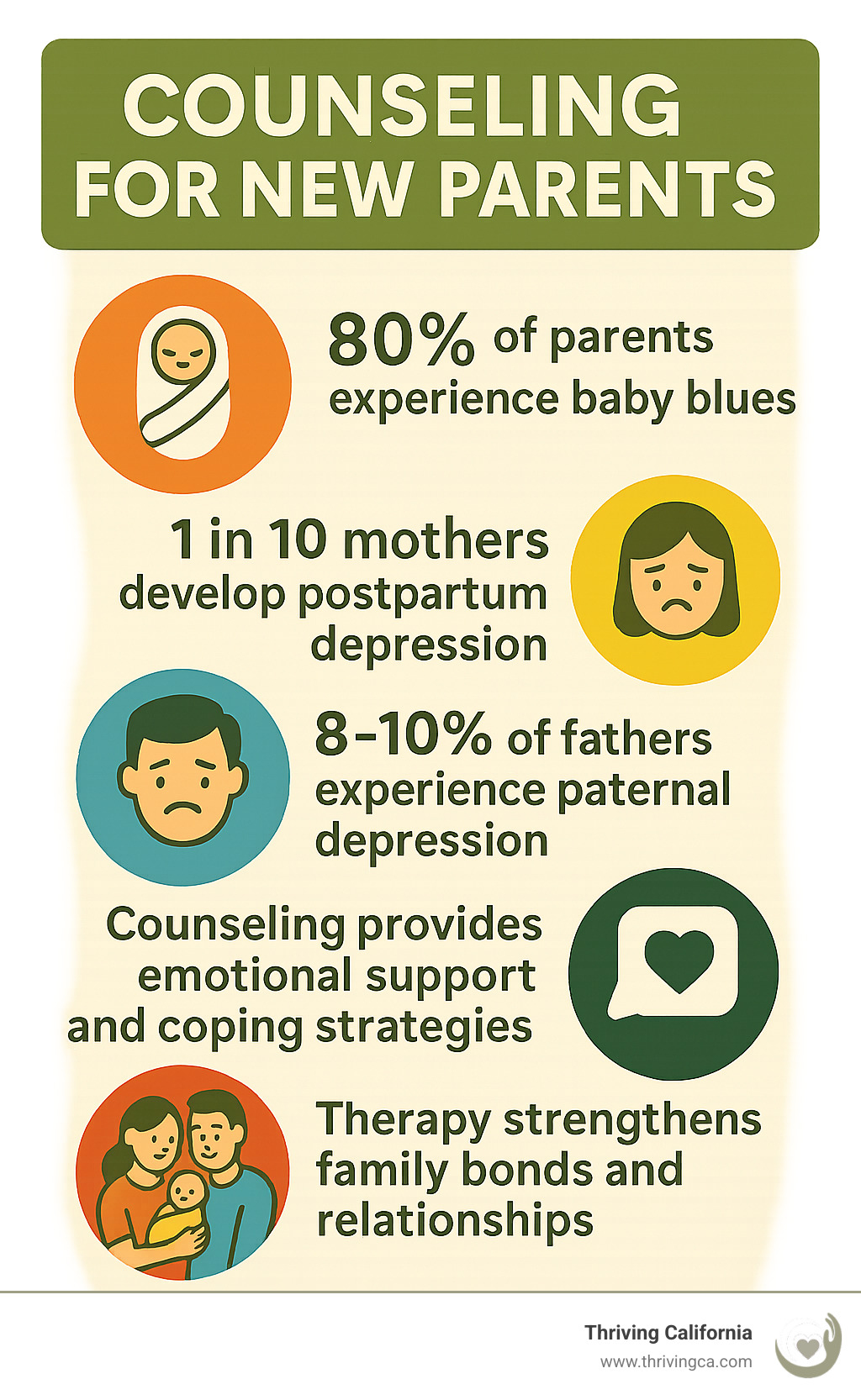Counseling for New Parents: Expert Support During Life's Biggest Transition
Why New Parents Need Professional Support More Than Ever
Becoming a parent represents one of the most transformative journey you'll experience in your lifetime. While this transition brings immense joy and meaning, it also introduces unprecedented challenges that can feel overwhelming, even for first time parents who have prepared extensively. New parent counseling provides essential emotional support during this critical transition, helping families navigate the complex emotions and stress that accompany early parenthood.
This transformative journey affects every aspect of your life, and many new parents find themselves struggling with self doubt, sleepless nights, and the overwhelming responsibility of caring for a new baby. Parent counseling offers the guidance and coping strategies necessary to manage stress while embracing the joy of your new role as parents.
The transition to parenthood affects every aspect of your life—your sleep patterns, relationships, career, and fundamental sense of identity. Modern parents often lack the extended family support systems that previous generations relied upon. Professional counseling fills this crucial gap by providing emotional validation, practical tools, and expert guidance tailored to your unique family situation.
At Thriving California, our group practice specializes in supporting parents with young children through evidence-based therapeutic approaches that address both individual and relational needs. We understand that every family's journey is different, and we customize our approach to meet your specific circumstances and goals.
Understanding the Emotional Landscape of New Parenthood
The Reality of Adjustment Challenges
Research shows that up to 80% of new parents experience mood changes in the weeks following delivery, while approximately 10% of mothers and 8-10% of fathers develop postpartum depression. Despite these statistics, many new parents struggle in silence, believing they should instinctively know how to navigate this life-changing experience. Understanding the difference between baby blues and more serious postpartum mood disorders is crucial for parents seeking appropriate mental health support.
The hormonal shifts, physical recovery, and constant demands of caring for a newborn often create mood swings, irritability, or unexpected grief for your pre-baby life. Many new parents also experience guilt about how they're spending time with their child or struggle to balance self care with caregiving responsibilities. These mixed emotions are completely normal, but without a safe space to process them through parent counseling, they can develop into more significant mental health challenges that require professional intervention.
When Normal Adjustment Becomes Clinical Concern
While some emotional ups and downs are expected during the postpartum period, certain signs indicate parents should seek therapy for professional support:
Immediate Professional Support Needed:
- Thoughts of harming yourself or your baby
- Severe or persistent anxiety, panic, or hopelessness lasting beyond two weeks
- Inability to sleep even when your baby sleeps
- Hallucinations or rapidly shifting moods
- Persistent difficulty bonding with your baby
Signs That Counseling Can Help:
- Overwhelming feelings of sadness or anxiety that interfere with daily life
- Constant worry about your baby's health or your parenting abilities
- Feeling disconnected from your partner or baby
- Intense anger or resentment toward your new role
- Difficulty making decisions or concentrating during this challenging transition
- Loss of interest in activities you previously enjoyed
Many new parents feel overwhelmed by these unique challenges, but a trained professional can provide the emotional support and coping strategies necessary to manage stress and develop confidence in your parenting journey.

Specialized Therapeutic Approaches for New Parents
Individual Therapy for New Parents
Our group practice integrates depth-oriented, relational, and somatic approaches to help you understand underlying patterns and develop sustainable coping strategies for managing the stress and emotions of parenthood.
Psychodynamic and Relational Therapy: We explore how your past relationships and experiences influence your current parenting journey. This approach helps you understand your emotional reactions and develop greater self-awareness as you navigate your new role as a parent.
Internal Family Systems-Informed Work: This therapeutic approach, grounded in attachment theory, helps you identify different parts of yourself—the anxious part, the exhausted part, the guilty part—and learn self-compassionate ways to respond to these internal experiences during your transformative journey.
Somatic Approaches: Quick, practical techniques help calm an overstimulated nervous system and manage the physical manifestations of stress and anxiety that often accompany new parenthood. These strategies support emotional regulation and help parents feel more grounded during sleepless nights and overwhelming days.
Birth Trauma Therapy
Birth trauma can profoundly impact your transition to parenthood, affecting your relationship with your baby, your partner, and yourself. Our specialized birth trauma therapy uses somatic resourcing and bilateral stimulation techniques to help process difficult birth experiences.
This focused therapeutic approach typically takes 3-6 sessions for individuals or 6-12 sessions for couples. We work systematically through your birth story, beginning with conception and pregnancy, moving through the birthing experience, and addressing the postpartum period. Most clients experience significant reduction in trauma symptoms by the completion of treatment.
Please note: Birth trauma therapy is available at our Napa location only.
Couples Therapy for New Parents
The arrival of a baby inevitably changes your relationship dynamics. Research shows that relationship satisfaction often declines after the birth of a first child, creating unique challenges for couples navigating parenthood together. Our couples therapy approach, informed by Gottman principles, helps partners navigate these changes while strengthening their connection and restoring intimacy.
What We Address in Couples Therapy:
- Communication challenges during this stressful period, focusing on healthy communication strategies
- Conflict resolution skills that work even during sleep deprivation and overwhelming days
- Fair division of childcare and household responsibilities as you adjust to your new roles
- Maintaining emotional and physical intimacy while caring for your new baby
- Managing different parenting philosophies or approaches to child care
- Dealing with extended family pressures and boundary setting around your growing family
Most couples at our group practice achieve their relationship goals within a year of consistent therapeutic work, developing stronger communication skills and greater emotional support for one another throughout their parenting journey.

The Therapeutic Process at Thriving California
Getting Started: Your First Steps
Beginning therapy can feel overwhelming when you're already managing the demands of new parenthood and feeling overwhelmed by sleepless nights and constant care for your new baby. We've designed our intake process to be as straightforward and accessible as possible, recognizing that many new parents need flexible therapy options that work with their unpredictable schedules.
Most families start by booking a free 20-minute consultation through our online scheduling system. During this conversation, we learn about your specific challenges and determine whether our approach aligns with your mental health needs. We also discuss logistics like scheduling and answer any questions about the therapeutic process and available therapy options.
If our group practice isn't the ideal fit for your situation, we provide appropriate referrals to ensure you find the right support. If we are a good match, we move into practical details like scheduling sessions that work with your baby's routine and discussing what you can expect from therapy.
Some parents prefer to begin therapy immediately without the preliminary consultation, especially when they're ready to seek therapy right away. We're completely comfortable with this approach and can use the first session to assess compatibility while beginning the therapeutic work.
Once you decide to move forward, we register you in our system where you'll complete brief, straightforward intake paperwork. We keep this process simple because we understand your time and energy are limited.
What to Expect in Therapy Sessions
Each 50-minute session is designed to be both nurturing and productive, recognizing that your time is precious and you want meaningful progress in managing the stress and emotions of caring for your child.
For Depth-Oriented Individual Work: In the initial sessions, we focus on gathering information and building a strong therapeutic relationship within a safe space. We explore the aspects of your life that feel most relevant to your current struggles, whether that's adjusting to your new role or managing overwhelming feelings. Sometimes this involves examining childhood experiences or past relationships; other times we focus on current stressors and relationships. We follow your lead regarding what feels most important to address, providing guidance and coping strategies tailored to your specific needs.
For Birth Trauma Work: We move systematically through your birth experience, starting with conception and pregnancy, then the birth itself, and finally the postpartum period. As we work through your story using specialized strategies, you'll likely notice a reduction in trauma symptoms. We use a scaling system to track progress, with most clients moving from high distress levels to minimal triggering by the end of treatment.
For Couples Work: We help you understand the relationship dynamics that may be keeping you stuck and teach practical communication skills that support both partners. We reflect back patterns we observe and help you express your needs more effectively while understanding where your reactions originate, fostering emotional support between partners during this challenging transition.
Treatment Approach and Duration
We don't use rigid treatment plans. Instead, we hold therapeutic goals in mind while remaining flexible about what emerges during our work together. Often, what people initially want to address shifts as therapy progresses, and we embrace this natural evolution.
For parents seeking depth-oriented, relational work, sessions typically occur weekly and can continue for as long as feels beneficial to your family. For birth trauma work, treatment is more time-limited, usually requiring 3-6 sessions for individuals and 6-12 sessions for couples.
We may offer suggestions for self-care practices or coping strategies that support your therapeutic work, but we don't assign homework or structured exercises. Our focus is on creating a space where healing and insight can naturally unfold.
Accessing Our Services Throughout California
Location and Telehealth Options
Thriving California serves families throughout the state with our physical location near Napa, conveniently serving the surrounding communities including Lafayette and Thousand Oaks. We also offer comprehensive telehealth services statewide, making specialized new parent counseling accessible whether you live in a rural area or simply can't leave the house with a fussy baby during those overwhelming sleepless nights.
Our telehealth platform is user-friendly and secure, allowing you to receive quality therapeutic care from the comfort of your own home. This option is particularly valuable for new parents dealing with unpredictable baby schedules, those who feel overwhelmed by the logistics of leaving home, or parents who prefer the convenience of receiving emotional support without the stress of travel.
Out-of-Network Benefits and Payment
We work as out-of-network providers, which means we don't contract directly with insurance companies. However, many families can receive partial reimbursement through their out-of-network benefits.
We provide detailed superbills that you can submit to your insurance company for potential reimbursement. The amount you receive depends on your specific plan's out-of-network benefits, deductible, and coverage percentages.
Many clients also use Health Savings Accounts (HSAs) or Flexible Spending Accounts (FSAs) to pay for therapy services, which can provide tax advantages. For specific information about fees and payment options, we encourage you to discuss this during your consultation or first session.

Building Healthy Foundations as New Parents
The Importance of Self Care During Early Parenthood
Developing sustainable self care practices isn't selfish—it's essential for your well being and your ability to care for your family. When you're running on empty from sleepless nights and constant stress, even small challenges can feel overwhelming, and emotional regulation becomes much more difficult for new parents navigating this transformative journey.
Essential Areas of Focus:
Sleep: Even short naps or trading off nighttime duties with a partner can make a significant difference in your mental health and resilience. We help you develop realistic strategies for maximizing rest within the constraints of new parenthood, teaching you how to manage the profound impact of sleep deprivation on your emotions and daily functioning.
Nutrition: A well-balanced diet supports your mood, energy levels, and overall health. Simple, nourishing meals help stabilize your emotional state and provide the fuel you need for the demands of parenting a new baby.
Routine: Establishing gentle daily rhythms—even flexible ones—helps new parents feel more grounded and in control. Small rituals like a morning walk or quiet moments with tea can create predictability in an otherwise unpredictable season of caring for your child.
Connection: Maintaining relationships with your partner, friends, and extended family provides crucial emotional support. We help you communicate your needs effectively and maintain important connections during this intense period, fostering healthy communication that strengthens your support network.
Supporting Your Child's Development Through Your Own Healing
Parents serve as the emotional regulation system for their children during this critical transition. When you learn to notice and manage your own emotions effectively, you help your baby's developing nervous system learn to do the same. A trained professional can guide you in developing these essential skills that have a profound impact on your child's emotional development.
Our therapeutic work addresses barriers to healthy bonding while providing practical strategies for fostering secure attachment. This includes maintaining eye contact during feeding, engaging in responsive caregiving, and participating in attuned play that supports your child's emotional development. These approaches, rooted in attachment theory, help create the foundation for your child's future emotional well being and healthy relationships throughout several years of development.
Frequently Asked Questions
When should we start counseling?
There's no perfect timing for beginning counseling as new parents—it depends entirely on your family's mental health needs and circumstances. Some parents find it helpful to start during pregnancy, particularly if they're experiencing anxiety about birth or have previous mental health concerns. Others seek therapy in the first weeks after birth when the reality of caring for a newborn feels overwhelming and they're struggling with sleepless nights and constant stress.
The most important factor is trusting your instincts about when to seek therapy. If you're struggling with self doubt, feeling overwhelmed by your new role, or simply want additional emotional support during this major transition, it's never too early or too late to begin therapy. Early intervention can prevent small challenges from developing into larger problems, but seeking help is beneficial at any stage of your parenting journey and can provide immediate relief for symptoms of anxiety or depression.
Can partners participate in therapy?
Absolutely. The transition to parenthood affects everyone in the family, not just the birthing parent. Non-birthing partners often face unique challenges including feeling disconnected from the parent-child bond, managing financial stress, navigating relationship changes, or experiencing their own identity shifts as they adjust to their new role.
We offer both individual therapy for partners and couples sessions where you work together to strengthen your relationship and develop effective communication skills. Paternal postpartum depression affects approximately 8-10% of new fathers and deserves the same attention and support as maternal mental health concerns. New fathers and partners often benefit significantly from therapy options that address their specific experiences and emotions during this transformative journey.
Partners may struggle with feeling left out of the bonding process with their new baby, managing work-life balance while supporting a new mom, or processing their own feelings about the profound changes happening in their family. These concerns are valid and deserve professional attention from a trained professional who understands the unique challenges partners face during the transition to parenthood.
What if we're still pregnant but already feeling anxious?
Pregnancy anxiety is incredibly common and completely understandable—you're preparing for one of the biggest changes in your life. Starting counseling during pregnancy can be highly beneficial, giving you time to develop coping strategies, work through concerns, and build a strong support foundation before your baby arrives.
If you've experienced previous pregnancy losses, struggled with fertility, or have a history of anxiety or depression, pregnancy can feel especially vulnerable. Professional support helps you navigate these challenges and approach parenthood with greater confidence.

Crisis Resources and Immediate Support
If you're experiencing thoughts of harming yourself or your baby, or if you're in immediate emotional distress, please reach out for help immediately. Crisis support is available around the clock.
Emergency Resources:
- National Suicide & Crisis Lifeline: 988
- Postpartum Support International Helpline: 1-800-944-4773
- Crisis Text Line: Text HOME to 741741
- National Maternal Mental Health Hotline: 1-833-9-HELP4MOMS
- For immediate danger: Call 911 or go to your nearest emergency room
Take the Next Step Toward Support
Parenthood can feel both breathtaking and breath-stealing. Counseling for new parents isn't about achieving perfect parenting—it's about receiving steady, compassionate support while you navigate uncharted territory.
Our doctoral-level clinicians at Thriving California offer personalized therapy from our location near Napa or anywhere in California through telehealth services. Whether you're dealing with postpartum depression, relationship challenges, birth trauma, or the general adjustment to parenthood, you deserve expert guidance during this transformative time.
Beginning with a free 20-minute consultation is simple: schedule a time that works for you, share your concerns, and determine if our approach feels right for your family. If we're not the ideal fit, we'll provide trusted referrals because every family deserves the right support to thrive.
Ready to take the next step toward a calmer, more connected family life? Reach out today to learn more about our therapy services and begin your journey toward greater wellbeing and confidence as new parents.

